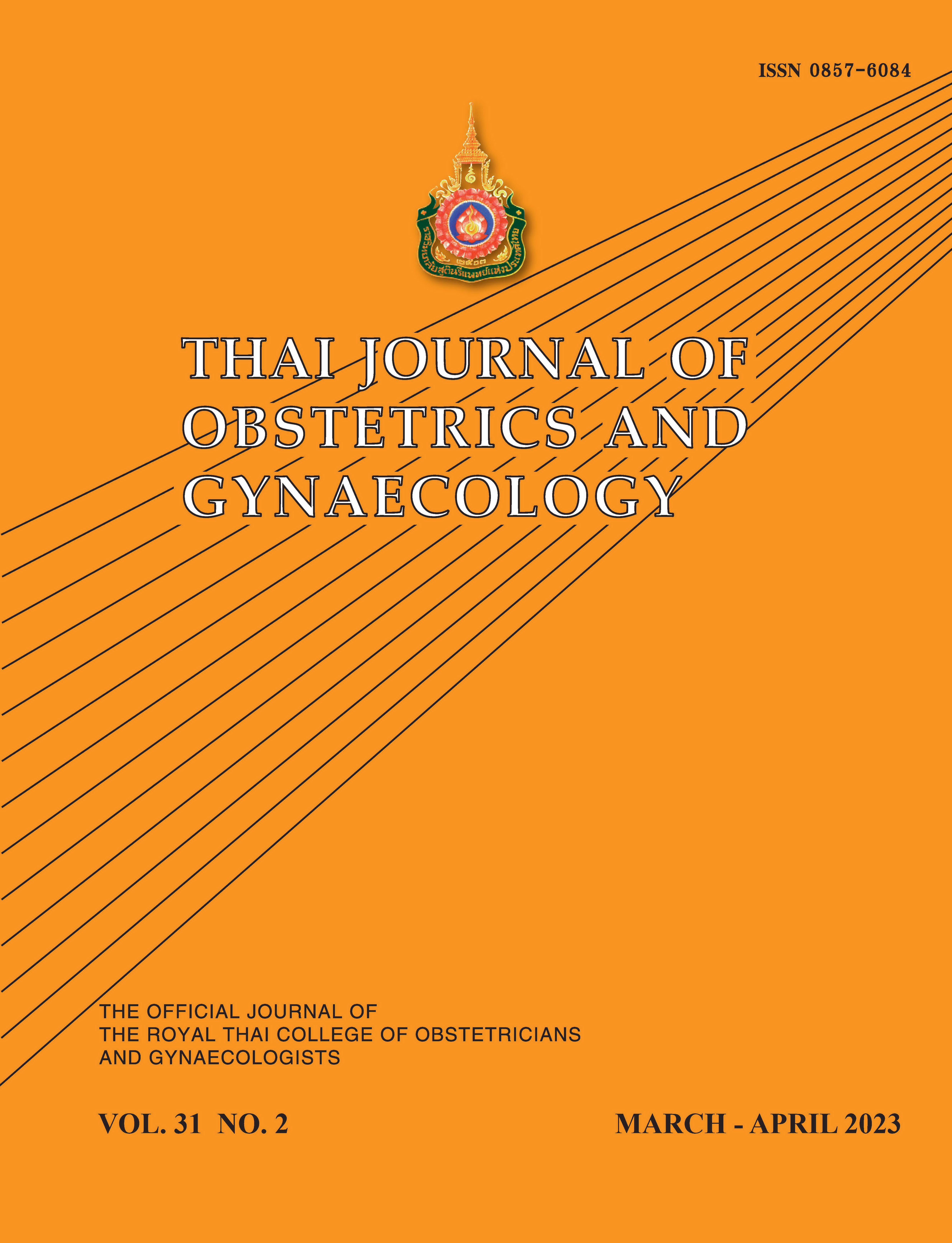Hormonal Replacement Therapy after Gynecologic Cancer Treatment
Main Article Content
Abstract
Patients diagnosed with gynecologic cancers are principally managed by radiation, chemotherapy, and total hysterectomy with bilateral salpingo-oophorectomy. The resultant loss of ovarian function associated with gynecologic cancer treatments poses major health concerns as patients face the long-term effects of early menopause. The health implication entails vasomotor symptoms, osteoporosis, cognitive impairment, and increased cardiovascular risks, to name a few. Patients with gynecologic cancers are likely to require intervention, as loss of ovarian function due to cancer treatments tend to produce more severe symptoms than those from natural menopause. Hormonal replacement therapy (HRT) has shown to be an excellent option for treating menopausal symptoms. However, initiating HRT remains a challenge due to the expression of hormone receptors in most gynecologic cancers. This article aims to provide current evidence regarding HRT in managing menopause after gynecologic cancer treatment.
Article Details

This work is licensed under a Creative Commons Attribution-NonCommercial-NoDerivatives 4.0 International License.
References
Sung H, Ferlay J, Siegel RL, Laversanne M, Soerjomataram I, Jemal A, et al. Global cancer statistics 2020: GLOBOCAN estimates of incidence and mortality worldwide for 36 cancers in 185 countries. CA a Cancer J Clin 2021; 71: 209-49.
Faubion SS, Kuhle CL, Shuster LT, Rocca WA. Long-term health consequences of premature or early menopause and considerations for management. Climacteric 2015; 18: 483-91.
Res M, Angioli R, Coleman RL, Glasspool R, Plotti F, Simoncini T et al. European Menopause and Andropause Society (EMAS) and International Gynecologic Cancer Society (IGCS) position statement on managing the menopause after gynecologic cancer: focus on menopausal symptoms and osteoporosis. Maturitas 2020; 134: 56-61.
Guidozzi F, Daponte A. Estrogen replacement therapy for ovarian carcinoma survivors: A randomized controlled trial. Cancer 1999; 86: 1013-18.
Eeles RA, Morden JP, Gore M, Mansi J, Glees J, Wenczl M, et al. Adjuvant Hormone Therapy May Improve Survival in Epithelial Ovarian Cancer: Results of the AHT Randomized Trial. J Clin Oncol 2015; 33: 4138-44.
Pergialiotis V, Pitsouni E, Prodromidou A, Frountzas M, Perrea DN, Vlachos GD. Hormone therapy for ovarian cancer survivors: systematic review and meta-analysis. Menopause 2016; 23: 335-42.
Li D, Ding C-Y, Qui L-H. Postoperative hormone replacement therapy for epithelial ovarian cancer patients: a systematic review and meta-analysis. Gynecol Oncol 2015; 139: 355-62.
Wong KK, Luk H, Malpica A, Bodurka DC, Shvartsman HS, Schmandf RE, et al. Significantly greater expression of ER, PR, and ECAD in advanced-stage low-grade ovarian serous carcinoma as revealed by immunohistochemical analysis. Int J Gynecol Pathol 2007; 26: 404-9.
Brennan A, Brennan D, Rees M, Hickey M. Management of menopausal symptoms and ovarian function preservation in women with gynecological cancer. Int J Gynecol Cancer 2021; 31: 352-9.
Power L, Lefas G, Lambert P, Kim D, Evaniuk D, Lotocki R, et al. Hormone Use After Nonserous Epithelial Ovarian Cancer: Overall and Disease-Free Survival. Obstet Gynecol 2016; 127: 837-47.
Son J, Carr C, Yao M, Radeva M, Priyadarshini A, Marquard J, et al. Endometrial cancer in young women: prognostic factors and treatment outcomes in women aged < 40 years. Int J Gynecol Cancer 2020; 30: 631-9.
Barakat RR, Bundy BN, Spirtos NM, Bell J, Mannel RS. Gynecologic Oncology Group Study. Randomized double-blind trial of estrogen replacement therapy versus placebo in stage I or II endometrial cancer: a Gynecologic Oncology Group Study. J Clin Oncol 2006; 24: 587-92.
Edey KA, Rundle S, Hickey M. Hormone replacement therapy for women previously treated for endometrial cancer. Cochrane Database of Syst Rev 2018; (5) Art. No.: CD008830.
Desar IME, Ottevanger PB, Benson C, van der Graaf WTA. Systemic treatment in adult uterine sarcomas. Crit Rev Oncol Hematol 2018; 122: 10-20.
D’ Angelo E, Prat J. Uterine sarcoma: a review. Gyecol Oncol 2010; 116: 131-9.
Kelley TW, Borden EC, Goldblum JR. Estrogen and progesterone receptor expression in uterine and extrauterine leiomyosarcomas: an immunohistochemical study. Appl Immunohistochem Mol Morphol 2004; 12: 338-41.
Harris BS, Bishop KC, Kuller JA, Ford AC, Muasher LC, Cantrell SE, et al. Hormonal management of menopausal symptoms in women with a history of gynecologic malignancy. Menopause 2020; 27: 243-8.
Brzozowska M, Lewinski A. Hormonal replacement therapy in women with a history of internal genital organ malignancy. Menopause Rev 2021; 20: 34-39.
Vargiu V, Amar ID, Rosati A, Dinoi G, Turco LC, Capozzi VA, et al. Hormone replacement therapy and cervical cancer: a systematic review of the literature. Climacteric. 2021; 24: 120-7.
Ploch E. Hormonal replacement therapy in patients after cervical cancer treatment. Gynecol Oncol. 1987; 26: 169-77.
Rauh LA, Pannone AF, Cantrell LA. Hormone replacement therapy after treatment for cervical cancer: Are we adhering to standard of care? Gynecol Oncol 2017; 147: 597-600.
Kuhle CL, Kapoor E, Sood R, Thielen JM, Jatoi A, Faubion SS. Menopausal hormone therapy in cancer survivors: A narrative review of the literature. Maturitas 2016; 92: 86-96.
Bodner K, Laubichler P, Kimberger O, Czerwenka K, Zeillinger R, Bodner-Adler B. Oestrogen and progesterone receptor expression in patients with adenocarcinoma of the uterine cervix and correlation with various clinicopathological parameters. Anticancer Res 2010; 30: 1341-5.
Lacey Jr JV, Brinton LA, Barnes WA, Gravitt PE, Greenberg MD, Hadjimichael OC, et al. Use of hormone replacement therapy and adenocarcinomas and squamous cell carcinomas of the uterine cervix. Gynecol Oncol 2000; 77: 149–54.


